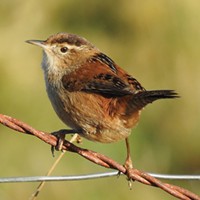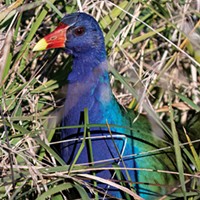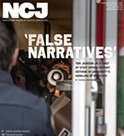[
{
"name": "Top Stories Video Pair",
"insertPoint": "7",
"component": "17087298",
"parentWrapperClass": "fdn-ads-inline-content-block",
"requiredCountToDisplay": "1"
}
]
Of all the birding news stories that came down in 2023, perhaps none was more unexpected than the American Ornithological Society's (AOS) decision to change the names of up to 152 North American bird species, eliminating honorific and eponymous names.
That means so long, Steller's jay. Bye-bye, Brewer's blackbird. Hasta la vista, Heermann's gull.
Why? Because in the early days of ornithology, when new species were being "discovered" left and right, a lot of cool birds were named after explorers and naturalists who in some cases were also Confederate generals, slave owners and robbers of Indigenous graves.
Even John James Audubon, whose name was once synonymous with bird conservation and who has several species named after him, was a slave owner and anti-abolitionist, prompting a movement among regional affiliates of the National Audubon Society (NAS) to distance themselves from the parent organization by renaming their chapters. The Redwood Region Audubon Society considered the issue at last October's board meeting and opted, for now, to keep the Audubon name, citing the difficulties in renaming a registered nonprofit and a desire to maintain ties with the NAS. Other chapters, including Seattle, Washington, and Portland, Oregon, have cut ties and moved forward with the changes.
But addressing the issue of birds named after people seemed an impossible undertaking until a grassroots organization called Bird Names for Birds gained traction. The group argues that a bird's name should reflect characteristics of the bird and contribute to its identification, not be a living monument to some of the darkest chapters in our nation's history. It was an uphill battle; the AOS traditionally has been a stodgy group, disinclined to change and as slow in its workings as a banana slug oozing across a freshly washed window.
That's why the AOS's sudden reversal in November took a lot of birders by surprise, even those who championed the name-change cause. AOS President Colleen Handel said of the decision, "There is power in a name, and some English bird names have associations with the past that continue to be exclusionary and harmful today."
For the most part, reaction has been strongly favorable, especially since the renaming will take place in manageable increments — about six species a year — and public input will be a key part of the process. However, more than a few feathers have been ruffled. A petition is circulating that challenges the AOS's decision as "destabilizing" and suggests changing bird names will be ineffective in creating an environment of inclusivity in ornithology and birding. The very consistency of bird names, the petition says, promotes effective communication across all facets of the birding community.
In my mind, "consistency" equals "complacency" in the context of addressing historical wrongs. It's always easier to do nothing rather than something, right? So I'm completely on board with these changes. Well, almost completely: I have a few shelves' worth of bird guides that will soon become obsolete, though I can always edit them with a Sharpie (the marker, not the skinny-legged hawk). And I have a realistic view of the limitations of my memory banks, already somewhat overdrawn. We're talking a lot of new names here.
On the other hand, it's a great opportunity to bring some pizazz to the monikers of our North American birds, names as catchy and memorable as the Fiery-throated metaltail of Peru, or the Satanic nightjar of Indonesia, or especially Bolivia's Mustached flower-piercer (reminds of a guy I knew in college). These are names that capture the splendor and uniqueness of birds. Here in the U.S., we're saddled with clunkers like MacGillivray's warbler, which I can't even pronounce without a shot of tequila first.
We can do better. I've asked around, and made a short list of suggestions for some of the species that fall within our Humboldt purview, names that any bird would be proud to sport.
Townsend's warbler, named after John Kirk Townsend, a 19th century naturalist. Along with collecting specimens of flora and fauna, Townsend was known for desecrating Indigenous peoples' burial sites. He won't be missed. My suggestion: Charcoal-masked lemony warbler.
Cooper's hawk, named by Charles Lucien Bonaparte (nephew of that other famous Bonaparte) in honor of his friend William Cooper, a 19th century naturalist and collector. Cooper's hawks are known for eating small birds — one grabbed a junco from my feeder just the other day — and in Soulatluk, the Wiyot language, the Cooper's hawk is Tsoutsgish wiwilh ("eats birds" or "bird-eater"), according to Lynnika Butler, linguist for the Wiyot Tribe.
Wilson's snipe, named for late-1700s ornithologist Alexander Wilson. When this odd little shorebird bursts out of hiding and flies off, its tailfeathers make a distinctive sound called "winnowing." My suggestion: Googly-eyed meadow-winnower.
Bullock's oriole, named in honor of William Bullock, a mine owner and collector in the early 1800s. Local birder Ian Gledhill, who often sees the oriole in trees, suggests this name: Arboreal sub-boreal oriole.
Lincoln's sparrow. I always thought the Lincoln's sparrow (one of my favorite birds) was named after our 16th president, about as solid a guy as you could ask for. But no — it's after Thomas Lincoln, who accompanied Audubon on an expedition and shot the sparrow in the middle of its song. That sort of ruins it for me. Humboldt birder Leah Alcyon suggests this zesty new name: Chai spice sparrow (not to be confused with the Pumpkin spice sparrow, formerly Nelson's, that sometimes overwinters at the Arcata Marsh).
Anna's hummingbird, named after the Duchess of Rivoli and the only woman among the klatch of white men on our list. Despite that distinction, it makes no sense to me that a North American hummer would be named for a French gentlewoman. My suggestion: Fuchsia-throated emerald nectar-sipper.
See how much fun this is? Birds adapt and so will we. The AOS says the changes will "engage far more people in the enjoyment, protection and study of birds." Birding is for everyone.
Have a great idea for a new bird name? Send it to the now less stodgy AOS — your inspiration could end up in a field guide someday soon. Visit americanornithology.org/about/english-bird-names-project to learn more.
Sarah Hobart (she/her) is a freelance writer based in Humboldt County.
Speaking of...
-

A Chime of Wrens
Apr 11, 2024 -

Spark Birds
Jan 11, 2024 -

Censored Stories, AI Moguls and Visiting Birds
Dec 8, 2023 - More »
more from the author
-
Three Great Places to Bird this Summer
- Jul 25, 2024
-
Condors Over Arcata
- Jun 6, 2024
-
A Chime of Wrens
- Apr 11, 2024
- More »
Latest in Get Out
Readers also liked…
-
A Walk Among the Spotted Owls
- Apr 27, 2023
































